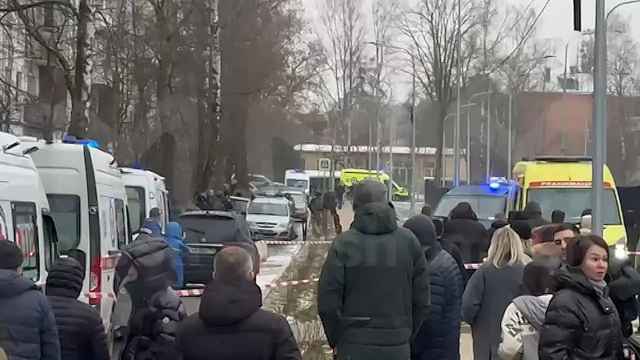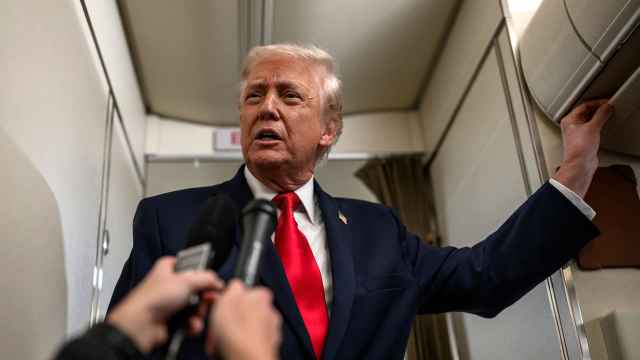Belarussian President Alexander Lukashenko has threatened to expel Russian journalists for sowing "hysteria" about a deepening financial crisis, prompting a stern warning from the Kremlin that a bailout loan he desperately needs might be canceled.
Lukashenko ominously criticized some Belarussian journalists working for foreign organizations, ordering the government at a meeting Friday to "make sure those media organizations no longer work on our territory."
But he directed his harshest criticism at the Russian media, which pose a greater danger to his rule because many Belarussians watch Russian television channels.
"Russian media were the most hysterical," he said, adding that he did not want to name the journalists or organizations because he did not want to increase their popularity.
A senior Kremlin official said Saturday that Lukashenko's outburst could undermine talks on the release of the first tranche of a loan of $3 billion to $3.5 billion from a Russian-led bailout fund on June 4.
"An implementation of this intention [to expel journalists] can … affect Russia's position on providing a loan to Belarus," the unidentified official told Interfax.
Belarus needs the cash as it grapples with a currency crisis. It devalued its ruble by 36 percent on Tuesday.
Lukashenko also warned Russia that Belarus would not sell off state assets cheaply to secure the emergency loan.
"Some foreign politicians … are saying that Lukashenko is starting to sell stakes in liquid companies and have even named the $7.5 billion figure," Lukashenko said in a clear reference to an estimate made earlier in the week by Finance Minister Alexei Kudrin.
"I'd like the first person in that line to tell others, 'Leave, there is no sale,' especially at bargain prices as suggested by some of those waiting to grab [assets]," he said, state news agency BelTA reported.
In announcing the pending loan last week, Kudrin said Minsk would need to sell $7.5 billion in state assets to complement it. On Friday, Kudrin reiterated that large-scale privatization was a necessary condition for the bailout loan.
Separately, Prime Minister Vladimir Putin said Friday that talks were at a "finishing" stage on Gazprom's acquisition of the Belarussian government's 50 percent stake in Belarus' gas pipeline network for $2.5 billion.
Gabriel Sterne, an economist at the Exotix brokerage, said the bailout deal could now fall through.
"The … possibility is they can't reach any agreement with Russia and the crisis goes from bad to worse and they edge to hyperinflation in a Zimbabwe kind of scenario," he said. "That's a very plausible scenario that markets until today haven't really been factoring in."
The devaluation has nearly wiped out generous wage increases made by Lukashenko's government in the run-up to December's presidential election. Lukashenko secured a fourth term in office in a vote criticized as fraudulent by Western monitors.
Consumer prices have soared, prompting people to hoard staples from sugar and sunflower oil to salt and vinegar. Officials say inflation could reach 39 percent this year.
Lukashenko on Friday also ordered officials to introduce price controls and said only local governors and the prime minister could now authorize price increases for consumer goods.
He threatened to sack Prime Minister Mikhail Myasnikovich and central bank chairman Pyotr Prokopovich if the new exchange rate policy failed.
(Reuters, AP)
A Message from The Moscow Times:
Dear readers,
We are facing unprecedented challenges. Russia's Prosecutor General's Office has designated The Moscow Times as an "undesirable" organization, criminalizing our work and putting our staff at risk of prosecution. This follows our earlier unjust labeling as a "foreign agent."
These actions are direct attempts to silence independent journalism in Russia. The authorities claim our work "discredits the decisions of the Russian leadership." We see things differently: we strive to provide accurate, unbiased reporting on Russia.
We, the journalists of The Moscow Times, refuse to be silenced. But to continue our work, we need your help.
Your support, no matter how small, makes a world of difference. If you can, please support us monthly starting from just $2. It's quick to set up, and every contribution makes a significant impact.
By supporting The Moscow Times, you're defending open, independent journalism in the face of repression. Thank you for standing with us.
Remind me later.






